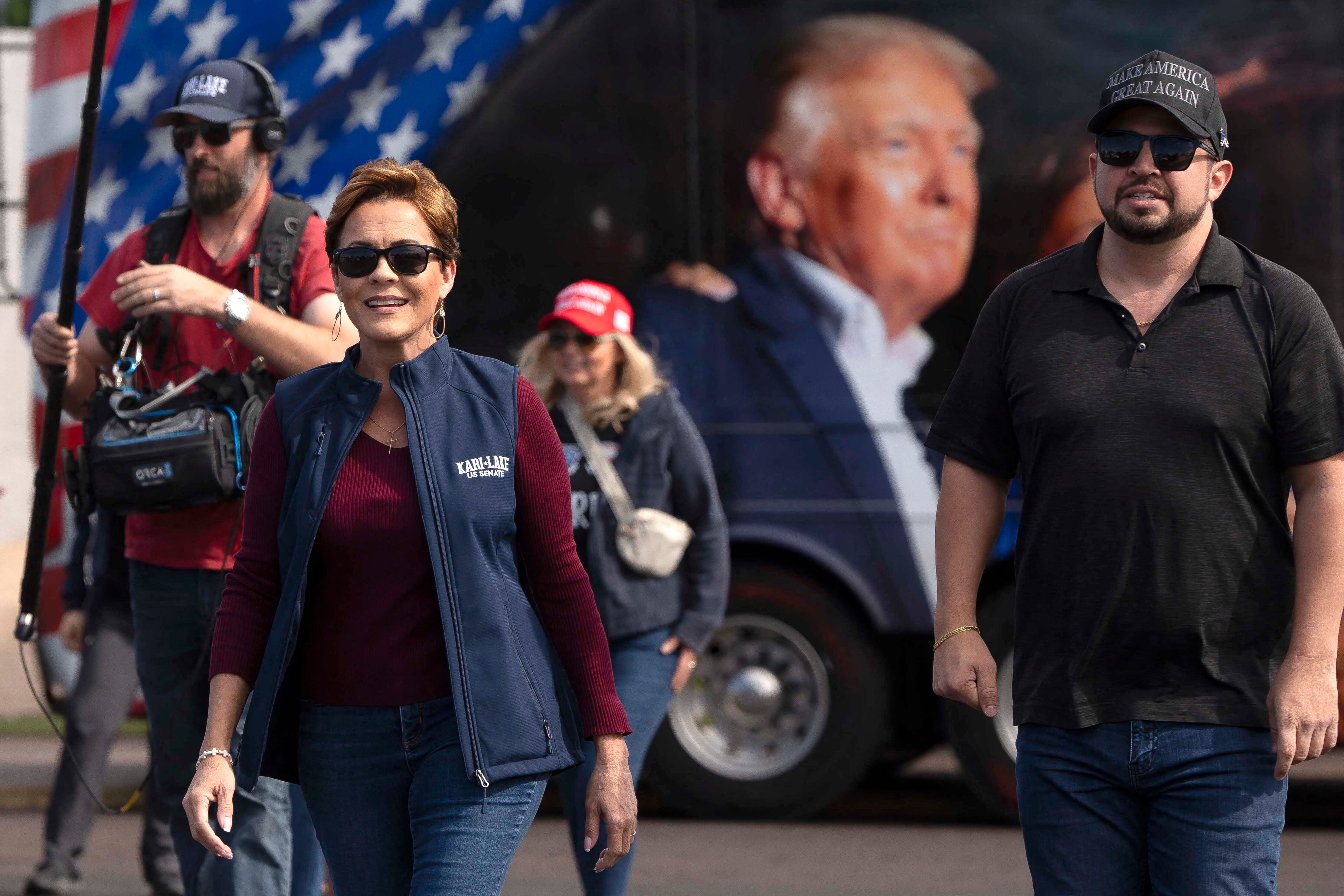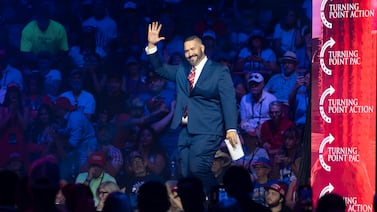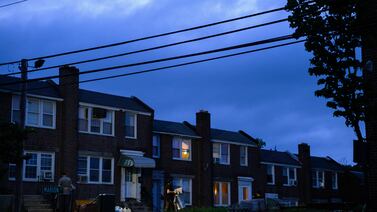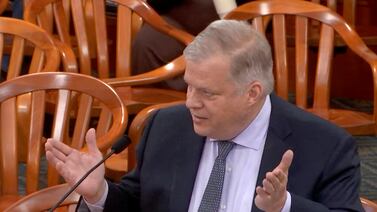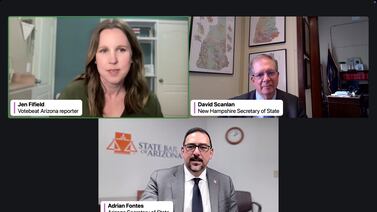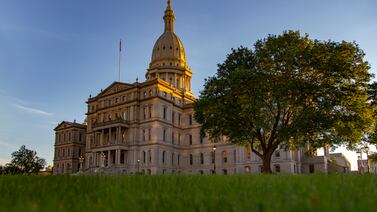Votebeat is a nonprofit news organization reporting on voting access and election administration across the U.S. Sign up for Votebeat Arizona’s free newsletter here.
After Kari Lake lost her U.S. Senate race in November, some skeptics cried election fraud. They doubted that so many people who voted for GOP presidential candidate Donald Trump, who carried Arizona, would split their ticket and back Ruben Gallego, Lake’s Democratic opponent.
In the past, local election analysts could counter such claims by analyzing a dataset known as the cast vote record — an electronic record of each anonymous ballot cast and all the votes recorded on it, including split-ticket votes.
But for this election, they’ve hit a roadblock: They can no longer get that data.
The counties that gave out their cast-vote record in the past now say that it is not a public record, or that they’ll provide only a heavily redacted version, without ruling specifically on whether the public is entitled to see it.
The limited access to the cast-vote record dismays some election analysts, including Benny White of Tucson, who said releasing it is important not only to quiet election fraud claims but also to ensure accuracy of results.
“If we are serious about making sure our elections are accurate, we have to find a way to more completely and comprehensively publicly audit the official results,” White said.
What is the cast vote record?
Arizona law is murky on whether the cast-vote record is the kind of document that can be released to the public. Because Attorney General Kris Mayes has not issued an opinion, counties have little guidance on whether they can or must make it available, and people who want to examine the election results have to fight from county to county for access.
The fight for the cast vote record in Arizona is just one recent example of the attempts across the country to meet voter demands for more election transparency and data, without compromising voters’ privacy. In Pennsylvania, for example, courts just ruled that the cast vote record itself is not a public record, but images of mail ballots are.
The cast vote record comes in different forms, but in many instances is a large spreadsheet with a record of the votes cast on each ballot, and other information indicating how and where the voter cast the ballot. Each row in the spreadsheet represents one voter’s ballot, and each column represents one of the choices on the ballot.
By itself, the cast vote record does not tie a voter’s name or identification number to a particular ballot. But in rare circumstances, pairing this dataset with the record of who voted in the election could show how some voters voted.
This occurred in Texas, where the cast vote record was one data source that activists apparently used to link a specific voter to the ballot he cast in a March 2024 primary election. After that, the state instructed election officials to redact election records far more extensively before releasing them.
While many Arizona counties have decided not to release the cast vote record, Maricopa County is currently preparing a redacted version for White. But White says the initial version he was sent last month was so heavily redacted it couldn’t be used for thorough analysis. Releasing the document in that form could “cause confusion, complaints of malfeasance, and mistrust of the election processes and the election officials,” he said.
In recent years, Republican lawmakers who say they want to improve voter trust have tried to change state law to specify that the cast vote record and corresponding digital images for each ballot are public records. Those proposals have gained some bipartisan support, including from Secretary of State Adrian Fontes, a Democrat, but concerns about privacy from voting rights groups stalled the proposals.
As the legislative session begins Monday, it’s unclear whether a proposal to clear up the law on cast vote records will be reintroduced this year. The main proponent, state Sen. Ken Bennett, a Republican, lost his seat in the July primary. Bennett said he would look for a new sponsor to carry that bill.
Until such a bill passes, individual counties “should not be deciding these issues haphazardly,” said Alex Gulotta, Arizona director of voting rights group All Voting is Local.
“Under current law,” he said, “there is no basis for releasing this information.”
Push for access pits transparency against privacy
Groups that oppose wider access to the cast vote records say their concerns are partly about how it could undermine the right to a secret ballot, which is guaranteed under federal law.
Some states allow the release of cast vote records as well as digital images of individual ballots. In limited circumstances, a person could figure out the identity and the choices of some voters by combining just a few datasets, if they aren’t redacted enough.
A recent study tried to determine just how limited those circumstances are. The study looked at a past Maricopa County election and found that the cast vote record, combined with voter information, could reveal the vote choices of 0.2% of the county’s voters — or fewer than 3,500 voters.
The study also pointed out that much of the data in the cast vote record that can lead to revealing a voter’s choices is already provided publicly in other ways, such as in reports of precinct-level results.
A Votebeat review of the precinct-level reports from small counties in Arizona’s November election found two instances in which combining that document with the record of who voted in each precinct would reveal voter choices. These were in small precincts with low turnout, where all of the voters who cast ballots in the precinct voted for the same candidate.
In one small precinct, for example, only four people voted for president, and they all voted for the same candidate. Looking up the four voters who participated in the election would reveal who they voted for.
Maricopa County releases those precinct reports, but the county’s system automatically redacts result from small precincts, Elections Director Scott Jarrett said.
Texas began ordering stricter redactions to protect voter secrecy last year after an investigation by Votebeat and the Texas Tribune showed that recent laws championed by state Republicans have made it easier to use publicly available election records to, in some instances, find how some people voted.
Last year in Texas, a conservative news site posted what it said was the primary ballot of former state GOP Chair Matt Rinaldi. The ballot had a vote for Florida Gov. Ron DeSantis, though Rinaldi had publicly endorsed Donald Trump in the primary.
Rinaldi did not respond to requests to confirm whether the ballot was his.
What does Arizona law say?
In Arizona, state law prohibits the release of electronic ballot data, but it doesn’t provide details on what exactly that means. And because Mayes has not issued guidance, Fontes’ office doesn’t have a formal legal opinion. So even though Fontes personally supports releasing the records, his office hasn’t told counties what to do.
Counties that say the record is exempt from disclosure, or not public, cite a few pieces of state law. One states that while counties are obligated to make certain existing records public, they do not need to create new records in response to public records requests. Some counties say that the cast vote record is not automatically sent to them from the voting machine company, so they do not need to provide it. The other rationale often cited is the state law prohibiting officials from releasing electronic ballot data.
“The officer in charge of elections shall ensure that electronic data from and electronic or digital images of ballots are protected from physical and electronic access, including unauthorized copying or transfer,” the statute says, “and that all security measures are at least as protective as those prescribed for paper ballots.”
But John Brakey of liberal-leaning election transparency group Audit USA says that the state enacted that law in 2017 in response to his organization’s attempts to get digital images of ballots, and that lawmakers never said the cast vote record would be restricted by it. The state senator who proposed it, according to a transcript Audit USA filed in a related court case, said the law was meant to prevent manipulation of digital ballot images.
Request for record gets contentious
Audit USA has routinely requested access to ballot images and cast vote records in Arizona and other states for more than a decade, and has often sued to try to get the records. But recently, the organization became the target of a lawsuit over one of its requests.
After Audit USA requested the cast vote record from Santa Cruz County following the 2022 primary election, the county sued the organization, seeking a ruling from the courts on whether it was obligated to release or shield the records.
The county released the cast vote record from the November 2020 election “due to the belief that these records were similar to any other election report that provides an aggregate of votes cast, votes rejected, undervotes, overvotes, etc,” the county said in its complaint. But it said “research has revealed the CVR and CVR database are electronic records of each individual ballot unlike summary reports.”
The case has now gone back and forth between the trial and appellate courts, and is still pending.
Meanwhile, Audit USA has spent at least $50,000 in legal fees.
Brakey and Audit USA attorney Bill Risner said they aren’t sure why Santa Cruz officials didn’t just ask the state attorney general for an opinion on whether the cast vote record is a public record, as they are entitled to do.
Santa Cruz County officials declined to comment, citing the pending litigation.
Maricopa and Pima counties change their stance
White, the election analyst in Tucson, said he was able to obtain the cast vote record from both Pima and Maricopa counties in 2020. In 2022, Maricopa provided him with the record. That data helped his team of analysts prove why Trump lost the state in 2020, and why Lake lost her gubernatorial bid in 2022. But this year, both counties are refusing to give it out in its original form.
The Pima County Attorney’s Office has determined the cast vote record “to be electronic data created from the ballot,” according to Elections Director Constance Hargrove. The county therefore refused to provide it to Audit USA after this election, citing the prohibition in state law.
In Maricopa County, the first time the county was asked to produce the cast vote record was after the 2020 election, under a subpoena from state Senate Republicans looking to audit the election results, said Jarrett, the elections director. Then, after the 2022 election, the cast vote record was released under court challenges. Both times, the county decided to also release the record publicly.
But after realizing that the record could potentially be used to tie a ballot to a voter, Jarrett said, officials have decided to redact the record before releasing it, to protect voter privacy.
White said counties should find a way to provide a full record of the votes cast on each ballot, without sacrificing voter privacy.
“There are reasons to control access to the cast vote record,” he said. “However, those restrictions are not part of Arizona law.”
Jen Fifield is a reporter for Votebeat based in Arizona. Contact Jen at jfifield@votebeat.org.

